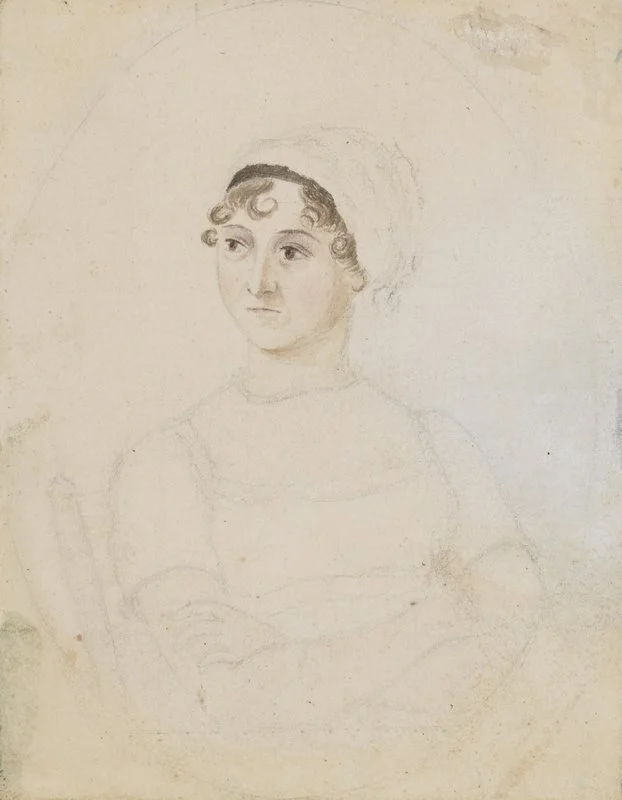Jane Austen: A Quiet Revolutionary Who Redefined Literature
/A portrait of Jane Austen by Cassandra Austen.
Jane Austen remains one of the most influential figures in English literature, celebrated not only for her wit and storytelling but also for her subtle defiance of the societal norms of her time. Born on December 16, 1775, in Steventon, Hampshire, she lived only 41 years yet reshaped the possibilities of the novel and opened doors for women in literature.
Early Life and Education
Austen grew up as the seventh of eight children in a lively and intellectually nurturing household. Her father, a clergyman, gave her access to his library at a time when girls were rarely encouraged to read widely or critically. While most women were limited to finishing schools and the occasional lesson in music or needlework, Austen immersed herself in history, classics, and contemporary literature. Though illness cut short her time at boarding school, she never stopped learning. By adolescence, she was already writing plays, short stories, and parodies, developing the sharp writing style that would later define her novels.
A Woman Writing in Secret
Publishing as a woman in the early 19th century was not socially acceptable. “Respectable” women were expected to marry, not write for money or public recognition. Austen’s first book, Sense and Sensibility (1811) appeared anonymously, credited only to “a Lady.” The anonymity allowed her to publish, but it also erased her identity from her art in her own lifetime. She went on to publish Pride and Prejudice, Mansfield Park, and Emma, with two more works, Northanger Abbey and Persuasion, released posthumously.
Social Critique Disguised as Romance
Though often remembered for their romance, Austen’s novels go far beyond love stories. They reveal the social and economic pressures that governed women’s lives, especially the reality that marriage was frequently a financial necessity rather than a romantic choice. Her heroines resist easy categorization: they are clever, independent, and determined to claim some measure of autonomy within a system stacked against them. Through her sharp wit and irony, Austen laid bare the constraints of class and gender, showing that women’s voices and choices mattered, even in a world that insisted otherwise.
Was Austen a Feminist?
Austen did not use the language of feminism, but her work embodies its spirit. By centering women as complex, thinking individuals, she challenged the cultural narrative that women were passive participants in their own lives. Her decision never to marry, coupled with her portrayals of heroines who resist societal expectations, shows her quiet defiance. While some critics once painted her as conservative, her writing reveals a woman deeply aware of gender inequality and determined to document its impact.
Death and Literary Rebirth
Austen’s life was cut short in 1817, but her influence only expanded after her death. The publication of her nephew’s memoir decades later revived public interest and secured her reputation. What began as the quiet work of an “invisible” female author evolved into a body of literature that continues to inspire generations.
Her Lasting Legacy
Austen was a literary innovator, refining narrative techniques such as giving her readers access to her characters’ rich inner lives. This style transformed how novels could capture psychology and social nuance. Her sharp dialogue, irony, and carefully crafted heroines laid the foundation for modern romantic fiction while doubling as social commentary.
Her impact reaches far beyond the 19th century. From Virginia Woolf to modern filmmakers, countless artists have drawn from her works. Today, strong female protagonists in novels and films owe a debt to the blueprint Austen created. Her stories remain widely read and constantly adapted, reminding us that her critique of class, gender, and power remains relevant. Her face on the British £10 note is more than a tribute: it is recognition of her revolutionary role in reshaping literature.
A Revolutionary Voice
Jane Austen lived a quiet village life, but her pen spoke louder than the restrictions placed upon her. She redefined what novels could be, showing that everyday women’s struggles and triumphs were worthy of art. More than two centuries later, her work continues to resonate because she proved that even in a world designed to silence women, their voices could still transform culture.
Évangéline Doucet is a professional translator turned writer, currently completing her final year in the Professional Writing program at Algonquin College where she has focused on honing her skills in editing, research, and digital communication. She is also a member of WordTonic, a global writing community where she is building her copywriting portfolio. When she’s not freelancing or studying, you can usually find her drafting essays and reflections on Substack, often inspired by literature, culture, and politics.




